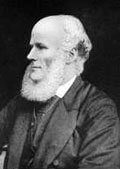the Last Week after Epiphany
free while helping to build churches and support pastors in Uganda.
Click here to learn more!
Bible Commentaries
Mackintosh's Notes on the Pentateuch Mackintosh's Notes
Old Testament
The creation, humanity's fall, the flood, and God's covenant with Abraham and his descendants. Exodus
Israel's escape from Egypt, receiving the Law, and covenant formation at Mount Sinai. Leviticus
Laws on sacrifices, purity, and holiness, guiding Israel's worship and community life. Numbers
Israel's wilderness journey, census data, and preparations for entering the Promised Land. Deuteronomy
Moses' final speeches reiterating the Law and renewing Israel's covenant before entering Canaan.
Author's Biography
Charles Henry Mackintosh, known widely by his initials C.H.M., was a prominent 19th-century Christian preacher, evangelist, and author, cherished for his profound impact on the Plymouth Brethren movement and Christian literature. Born in October 1820 in County Wicklow, Ireland, into a family with a military background, Mackintosh's early years did not initially suggest a future as a spiritual leader. However, his conversion to Christianity at the age of 18 marked the beginning of a lifelong journey dedicated to faith and the study of Scripture.
Mackintosh's spiritual journey was deeply influenced by the teachings of John Nelson Darby, a key figure in the early Plymouth Brethren movement. Embracing Darby's views, Mackintosh became a fervent advocate for the movement, contributing significantly to its growth and doctrinal development. His commitment to the Brethren was mirrored in his withdrawal from the established church, choosing instead to gather in the simplicity of New Testament church practice.
C.H.M. is best known for his extensive writings, which encompass commentaries, theological essays, and tracts. Among his most enduring works is the six-volume set "Notes on the Pentateuch," a comprehensive commentary on the first five books of the Bible. This work, characterized by its lucid exposition and practical application, has endured as a staple of Christian study.
Mackintosh's style was accessible and heartfelt, aiming to reach both the educated and the common reader. His writings emphasize the grace of God, the finished work of Christ, and the believer's walk in faith. Through his emphasis on the sufficiency of Scripture and the centrality of Christ, Mackintosh contributed to a deeper understanding of Christian doctrine and devotion.
Passing away in November 1896, Charles Henry Mackintosh left a lasting legacy within Christian communities. His life and works continue to inspire and educate believers, underscoring his timeless appeal and the enduring relevance of his contributions to Christian thought and practice.
